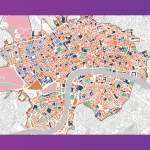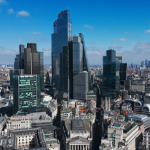As one of the few constituencies in Greater London considered a three-way contest, Cities of London and Westminster is likely to be a top battleground in the coming General Election. Having already interviewed the Labour and Liberal Democrat candidates hoping to be the area’s next MP, the final of this set of interviews is with Tim Barnes of the Conservative Party.
This interview took place before the Mayoral election on 2 May and the calling of the election on 22 May.
Tim Barnes is no outsider, having lived in the heart of Westminster for nearly 30 years since he first arrived in London as a student. “I arrived in London at the age of 19” he says, “walking through the West End, through Fitzrovia Bloomsbury, down to Covent Garden and I just was like – bloody hell, it’s pretty good, isn’t it?”
Barnes lives in Soho, an area which is surprisingly home to 4,000 people He acknowledges how lucky he is to live somewhere so special – “You don’t just have a local cinema, you have a cinema at the end of the street where there are film premieres. You don’t just have the local theatre, you have the best in the world, if you look down Oxford St, Selfridges is the corner shop.”
He was a serving Westminster City Council Conservative councillor for West End ward from 2018 until losing his seat in 2022. And now he’s standing to be the next MP for Cities of London and Westminster, a seat that has only ever elected Conservatives. It was back in March this year that the local Conservative Party chose Barnes as their candidate, after the sitting MP, his former council colleague Nickie Aiken, surprised the political world by announcing she wasn’t seeking re-election.
Barnes knows that the area is no normal constituency – it represents the very heart of one of the most famous cities in the world, home to a global centre of finance, the West End, the seat of Government, the residence of the Royal Family, major transport hubs, and a daily influx of thousands of commuters and tourists. With this comes a unique set of challenges – “noise, crime and how we manage them is a constant question of tinkering and rebalancing” he says, before pointing out that “fundamentally though, most of us live in the places we do because we like them.”
If Barnes wins on 4 July, he’ll be the MP for an area that contributes enormously to the UK’s economy. What more does he think needs to happen to support this? He picks on public transport, praising the success of the Elizabeth line and talking of further improvements in cross-river transport. He’s focused on ensuring buses running through the centre of the city are zero-emission and wants the Night Tube to be extended because “it doesn’t just help people at the end of the night to go home, important as this is, but it’s good for local residents too as it reduces revellers hanging around, creating noise and nuisance.”
Given his political roots, it’s unsurprising that he sees a limited role for government in supporting business – “the last group of people on earth that you want picking winners” – but instead refers to creating the right conditions to allow businesses to flourish. “Let’s make better urban environments,” he says, “attractive to the new industries of the future that create jobs and wealth.”
His attitude towards and interest in enterprise is matched with his work outside of politics. Barnes runs the Centre for Entrepreneurs charity, helping people to start businesses for the first time. When it comes to the developer and property world, Barnes draws on his time as a local councillor representing one of the most challenging wards around. “When I became councillor for the West End, it was home to half of all the planning applications in Westminster and had the same number of planning applications each year as Wales” and being the councillor there was “one of the most lobbied political positions in Britain outside of the cabinet.”
He recognises that the health of the city relies on constant renewal and regeneration, and new developments and construction is key to this. So his message to developers is clear and simple: “We’ll have a chat. We’ll go and look at your scheme. I’m not going to join you for dinner, thank you very much – but I will have a conversation about a project on its merits.”
Barnes also grasps the difficulties that the Net Zero agenda poses to construction, and warns against the dangers of “not being clear-eyed about this.” He won’t blanket dismiss all new developments as bad for CO2, because he believes that a lot of buildings were built to a “low standard in times past because of the economics of the time,” “leaking heat and energy,” and that knocking them down and replacing them with a new building can recover the carbon in under a decade.
His background in local politics is obvious – the way he approaches problems is very much through the prism of someone who has dealt with casework and had to solve issues on behalf of residents. One of his biggest gripes is e-bikes – anyone wandering around central London knows how they’ve proliferated in recent years, with public policy struggling to keep up with innovations in mobility. Barnes is campaigning on e-bike parking, pointing to how a daily influx of bikes is overwhelming parking capacity, leading to blocked pavements and streets.
More generally on cycling, he grasps that road users all wanting their own segregated space is very hard with the narrow roads and pavements of central London. “We just don’t have enough space,” he adds. He points to his predecessor finally getting regulation of pedicabs onto the statute book as “a great example of what a backbench MP can achieve” – but also to something that will benefit the residents of the constituency who’ve been blighted by pedicabs over the years.
It is not an easy time to be a Conservative in London – over recent elections, the blue on the political map of the capital has shrunk, most relevant to the coming challenge on 4 July being the loss of Westminster City Council to Labour in 2022 for the first time ever. The recent Mayoral election also saw strong swings to Labour in inner London and, for the first in its existence, the area elected a Labour Assembly Member. What does Barnes think about this?
“I don’t think if you look at the national polls that just applying them to London works,” he argues, before claiming that “people aren’t changing their minds very much compared to where they were a couple of years ago.” In what feels like an acknowledgement of the lingering impact of Brexit, Barnes refers to “the big issues driving the wider national opinion polls are things that Londoners were making their minds up about three or four years ago.” It’s pretty clear that he wants to distinguish himself from the unpopularity of his own party: “Basically this is about me as an individual MP. What am I going to do? Well, I live here. None of the other major candidates do.”
If he wins on 4 July, he’ll have to deal with a Labour council and Labour Mayor, and possibly even a Labour Government. How will Barnes respond in such a scenario? “Constructively,” he responds quickly and points to the support he provided to the new Labour council after the 2022 local elections, “grabbing a beer” with the new councillor taking over his cabinet brief. His view is quite clear on this – “It’s not in mine or my party’s interests for the new council to screw it up because we might be back running things before long.”
It’s only a few weeks now until polling day and we’ll soon find out if Barnes is successful. Given the high-profile location of the seat, and the likely efforts all sides will put into the campaign, it is sure to be a contest that will receive a lot of media interest.
This interview was conducted by London Communications Agency on behalf of the London Property Alliance as part of its curation of the monthly Central London newsletter.
Read more from our London Leaders series, including our interviews with the Labour and Liberal Democrat PPCs for Cities of London and Westminster, here.


